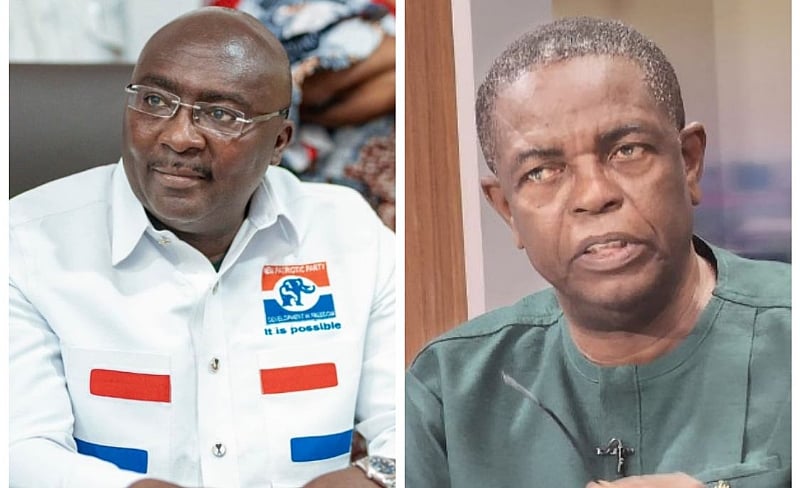Kwesi Pratt Jr., a seasoned journalist and Managing Editor of the Insight newspaper, has sharply criticized former Vice President Dr. Mahamudu Bawumia’s recent public apology for the shortcomings of the Nana Addo Dankwa Akufo-Addo administration. Dr. Bawumia, the New Patriotic Party’s (NPP) 2024 presidential candidate, offered this apology during his ongoing campaign, acknowledging areas where the government fell short and promising that lessons had been learned. However, Pratt questioned the sincerity and logic behind this apology, highlighting previous pronouncements by NPP members, including Bawumia himself, which painted a vastly different picture of the administration’s performance. Pratt’s central argument revolves around the apparent contradiction between the apology and the NPP’s prior claims of exceptional governance, even surpassing the achievements of Ghana’s founding father, Dr. Kwame Nkrumah.
Pratt recalled Bawumia’s earlier explanation for his loss in the previous election, attributing it to being a first-time contender, a common occurrence in Ghanaian politics. This narrative, Pratt argues, clashes with the current admission of failure. He further underscored the dissonance by referencing a controversial statement made by Dr. Matthew Opoku Prempeh, the NPP’s 2024 running mate, who boldly asserted that even Kwame Nkrumah’s accomplishments paled in comparison to the Akufo-Addo government’s. This juxtaposition of opposing narratives – one of unparalleled success and the other of acknowledged shortcomings necessitating an apology – forms the crux of Pratt’s critique. He essentially challenges the NPP to reconcile these conflicting positions and provide a coherent explanation for their shift in rhetoric.
Pratt’s questioning goes beyond mere political point-scoring; it delves into the fundamental principles of accountability and honest self-assessment in governance. He argues that if the NPP genuinely believes its performance to be the best in Ghana’s history, surpassing even Nkrumah’s legacy, then an apology becomes superfluous. The very act of apologizing implies an acknowledgement of failure, a contradiction to the narrative of exceptionalism previously espoused by the party. This contradiction, according to Pratt, raises serious questions about the NPP’s sincerity and its willingness to take responsibility for its actions.
Furthermore, Pratt’s commentary underscores the importance of consistency and credibility in political discourse. He implicitly criticizes the NPP for what he perceives as an opportunistic shift in narrative, driven by the exigencies of the upcoming election. By highlighting the inconsistencies in their messaging, Pratt seeks to expose the perceived political maneuvering and encourage a more honest and reflective approach to governance. He argues that genuine leadership requires a commitment to truth and accountability, rather than shifting narratives designed to appease the electorate.
Pratt’s call for “sober and reflective” individuals within the NPP who can “imagine and design a better future” reflects his deeper concern about the quality of leadership in the country. He implies that the current leadership, as evidenced by their contradictory statements, lacks the necessary introspection and vision to effectively address the nation’s challenges. This call for introspection extends beyond the NPP and serves as a broader commentary on the need for principled and visionary leadership in Ghanaian politics.
In essence, Pratt’s critique of Bawumia’s apology serves as a broader commentary on the state of political discourse in Ghana. He challenges the NPP to move beyond superficial apologies and engage in genuine self-reflection, acknowledging both successes and failures with honesty and consistency. His call for sober and reflective leadership underscores the need for a more principled and visionary approach to governance, one that prioritizes the long-term well-being of the nation over short-term political gains. Pratt’s remarks ultimately aim to elevate the level of political discourse and promote a more accountable and transparent system of governance.














